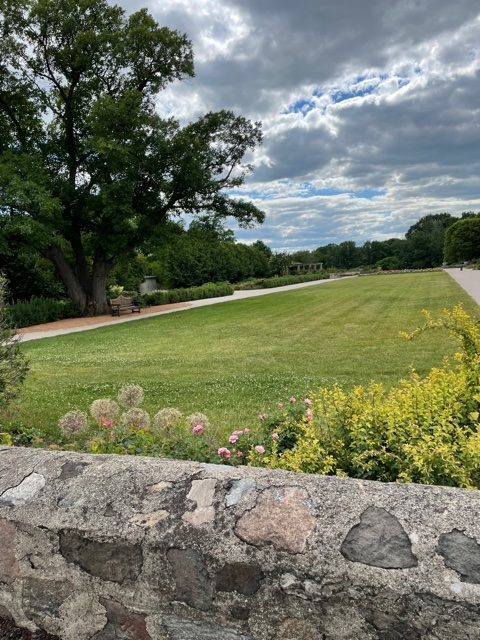It’s 1933 and Wisconsin is emerging from The Great Depression. Thanks to FDR’s New Deal program, federal dollars are beginning to flow into communities around the country, including Milwaukee, where visionary leaders years before had hired Frederick Law Olmsted, most famous for designing New York’s Central Park, to create a network of parks for the growing city. Olmstead believed that landscape architecture could serve various social purposes, including providing relief from crowded cities and encouraging people of varied backgrounds and social status to engage in community. Olmstead once described his park work as a “democratic development of the highest significance.”
Charles B. Whitnall, a florist, banker and City of Milwaukee Treasurer, agreed wholeheartedly with Olmstead’s approach. Often called the father of Milwaukee County Parks, Whitnall served on the county’s parks commission from 1907 until 1947. An idealistic and pragmatic Socialist, he championed the plan for a county-encircling network of parks and parkways that preserved rivers and creeks. In 1923, plans for 84 miles of connected parkways were created under Whitnall’s leadership. But it wasn’t until 1934 when federal funds turned those plans into a reality.
Think about that—our leaders invested in building parks (which also put people to work) during a time of the worst economic crisis in our nation’s history. What investments or funding reallocations could we make now that would put people to work AND benefit our kids, grandkids and great grandkids?
The Wisconsin Policy Forum answered that question in a recent research report entitled, “A Golden Opportunity for Wisconsin.” In it, they discuss how Wisconsin currently finds itself with an unprecedented windfall of $4.4 billion in projected state tax revenue. According to the report, this offers a “once-in-a-generation chance to address some of our state’s most longstanding challenges.” The report issues an ultimatum of sorts to our elected leaders, saying Wisconsin is “unlikely to get an opportunity like this one again; they should consider the consequences of failing to bridge partisan divides to seize it.”
So far, our Republican-controlled legislature has turned thumbs down (or middle finger up) to the report. Rather than make the kind of investments like the ones our leaders made in our parks system in the waning days of the Depression, our Republican leaders want to use this windfall to give tax cuts, not just to middle and lower wage earners as Governor Evers has proposed, but to businesses and people earning up to $350,000 per year.
In addition, Republicans want to use $2.6 billion in one-time federal funds meant to help Wisconsin schools and businesses recover from COVID instead of providing state funding in the typical two-year budget process.
Never mind that, when it comes to our schools, this approach puts billions in federal funding in danger since the feds require all states to use this funding as it was intended, and not as a replacement for state funding. Republicans have said they’ve figured out a way around this, but do you trust them? You’ll recall that these are the same folks who, just a few months ago, put at risk millions of federal dollars for food programs until Governor Evers stepped in and worked with the feds to ensure that low income families wouldn’t go hungry.
In his budget, the governor proposed investing in a number of areas that have long needed funding, like increased access to broadband, especially in rural areas. He proposed increased funding for special education, replacing lead pipes that sicken our kids, cleaning up our contaminated waterways, helping families better afford daycare, funding for maternal and infant mortality programs, fixing our antiquated computer unemployment system, and increasing mass transit for our largest cities so that people who want jobs can actually get to where the jobs are located. Of course, Republicans previously rejected an expansion of Medicaid that would have provided health insurance to thousands of low income Wisconsinites and bring another $1.6 billion in federal funding into our state. In fact, they’ve taken a pass or barely funded most of the governor’s Badger Bounce Back plan, gutting more than 400 budget items that are the kind of once-in-a-generation investments called for in the nonpartisan Wisconsin Policy Forum report.
This past week, my mom and I spent an afternoon at the Boerner Botanical Gardens, the crowning jewel in Charles Whitnall’s quest to bring Olmstead’s vision of an “emerald necklace” of connected parkways to fruition. Both of these leaders put the needs of the community first—not just the well-off, but average workers and people of little or no means. Can you imagine if Charles Whitnall and other leaders of that time had spent the federal dollars coming to Milwaukee on tax cuts for the already well-off citizens of that time? Or if they’d given even more tax cuts to businesses and corporations that pay little or no taxes to begin with?
A once-in-a-generation opportunity is before us. Didn’t COVID help us see or even personally experience the cracks in our society that have or will become gaping holes, or worse, if we don’t try to fix them now? Do we have the guts and collective vision to seize the day, like Whitnall, and create a world that won’t be better and more equitable for a few, but for all of us? Or will we put a little more money into our pockets today, and let future figure itself out?
The budget now moves to the full Legislature, which is expected to vote on it by June 30. It then moves to Evers, who could fully or partially veto the two-year spending plan.
As many have said, a budget is a moral document that reflects what we as a community value most. So let’s ask ourselves:
What kind of state do we want to live in? And what kind of communities do we want to leave behind for our kids and grandkids?
https://wispolicyforum.org/research/a-golden-opportunity-for-wisconsin/
Photo: Whitnall Park Boerner Botanical Gardens, June 2021


4 Comments
Thanks, Jill, for the historical perspective that shows how today’s decisions can enrich or impoverish tomorrow’s Wisconsin.
Thanks Petey. I appreciate the feedback, especially from as good a writer/editor/teacher as you!
I have heard you speak about the Once in a Generation ideas about funding public education. Thanks for giving a historical example (which I was not aware).
Thanks Karen. I have to give credit to John Gurda for demonstrating so eloquently the power of looking back in order to move forward. His essays are brilliant.